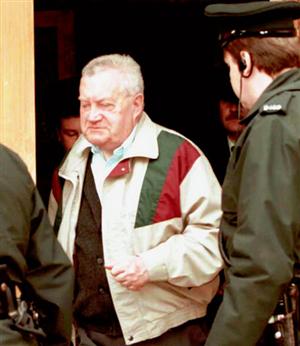By Bishop Kieran Conry
Newsweek
March 26, 2010
http://www.newsweek.com/id/235537
 |
| The Irish priest Brendan Smyth died in prison in 1997 during a 12-year sentence for 74 instances of sexual abuse. |
The Catholic Church should learn to listen to its victims; but we should all consider that the problem is not confined to Catholics.
When I went to work for the Catholic Church's media office in London in 1993, the three most common news stories about the church had to do with contraception, celibacy, and condoms. When I left seven years later, the topic of contraception had been displaced by the issue of the abuse of children.
In the mid-'70s the church in Ireland had been rocked by the case of Father Brendan Smyth, and the case of Father Michael Hill in England came back spectacularly to haunt Bishop Cormac-Murphy O’Connor when he was made archbishop of Westminster (and cardinal) in 2000. Since then, the church has never been able to move far from the question of child sexual abuse, and recent developments in Ireland and continental Europe—especially Germany—have seen more damaging revelations.
How much damage has been done is difficult to measure. The reputation of the church in the eyes of the secular world has undoubtedly suffered, but the church has never been greatly concerned with "image" in and of itself. But as an organization fundamentally dedicated to encouraging new members, it can't entirely ignore the image question.
As for its own members, most have probably retained faith in their local parish priest and religious sisters; they know that only a very small proportion of clergy has let them down. The abusers have also betrayed their fellow priests, and the sisters their sisters; their anger—the anger of clergy members themselves—is rarely acknowledged.
What does the church do now? Saying sorry is probably not enough, because only the people responsible can apologize. But if a bishop or priest did collude in any way with abuse, then a sincere gesture of repentance should be expected. In some cases this has meant resignation. But this will not always be enough. What the church in England and Wales has done is put in place guidelines for the handling of any allegation, to see that it is handled quickly and professionally (that is, handed over to the proper authorities). The Vatican commended them as a model for all other churches.
So what will help the victims? I don't know; only they can answer that, and the answers will be different. Certainly they should be listened to if they want to speak; many were silenced as part of the original abuse. They should not be abused in this way again. And apart from being silenced by threats from their abusers, many were often just not heard. I spoke to one woman recently who had been abused on school trips to the swimming pool. When she told her parents, they dismissed her claims as absurd. Many people have been unwillingly complicit in this sad history. We didn't have the language then, and had no grasp of the reality. So we should also have the humility to learn from victims; most people have no idea what abuse means until they hear a victim speak.
But now that we do have the language, it is difficult to understand why these cases are surfacing only now in Germany and Austria. Why has it taken so long? It's not as if those countries could have remained unaware of the church's problems elsewhere, mainly in the English-speaking world—some clerics in Rome referred to child-abuse as "the Anglo-Saxon problem." I fear that they are in for a shock. Why have cases not surfaced yet in Italy and Spain? Why have there not been reports from Africa and Latin America? Is it possible that there is something holding people back from confronting the issue of child sexual abuse, because they know that it cannot be confined to the church or any other lone organization that deals with children? It is too frightening, perhaps, to have to acknowledge the scale of the problem within all societies.
When Father Brendan Smyth was arrested in Ireland, he was photographed on his way to prison, scowling. The picture won an award, with the title "The Face of Evil." But one journalist warned that this was a terrible mistake. Child abusers do not look like this. They look like the well-dressed businessman (or -woman) sitting opposite you in the diner. They look just like the people you see in church on Sunday, or the people you share your house with. This is the most terrifying thing of all, and something we are not ready to imagine.
For the Catholic Church to regain some its lost credibility, it may have to speak with a different voice. Its voice in the past has been strident, often harsh. It may not be the best comparison, but it is better get loyalty from a dog with kindness, rather than obedience with a stick. Jesus spoke with a clear voice, but a gentle one. Chastened and humbled, the church will have to do the same.
Any original material on these pages is copyright © BishopAccountability.org 2004. Reproduce freely with attribution.